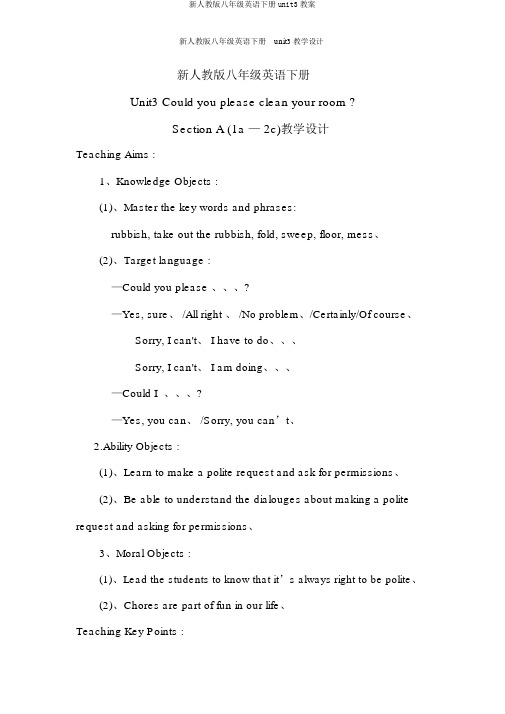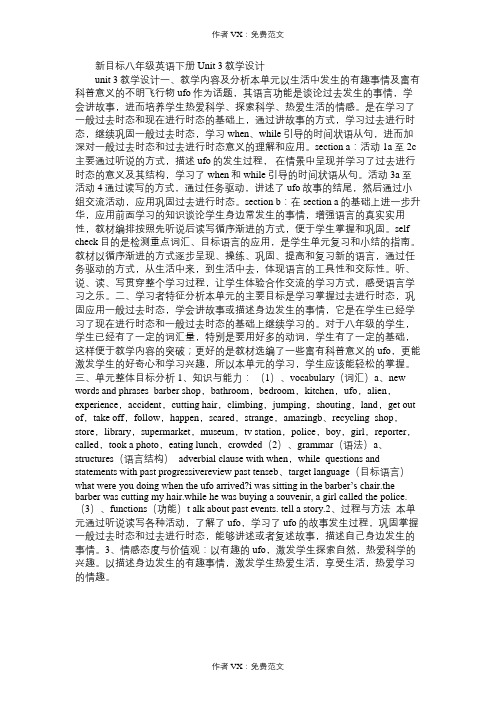八年级英语下册unit3单元教案
- 格式:docx
- 大小:32.64 KB
- 文档页数:6


(完整版)英语人教版八年级下册Unit3教学设计课题:Unit 3 Could you please clean your room?Period 1 (Section A 1a-1c)学习目标【Learning objectives】1.掌握单词: rubbish, fold, sweep, floor, take out the rubbish.2.学会礼貌地提出请求并熟练练习对话。
重点和难点【Important and difficult points】教学重点:能熟练拼读单词及短语rubbish, fold, sweep, floor, take out the rubbish.教学难点:学会用句型“Could you please…”来礼貌地提出请求。
预习内容【prepare lessons before class】1.要求学生掌握单词rubbish, fold, sweep, floor, take out the rubbish并指导学生找出家务活的表达方式。
2. 指导学生用“Could you please…”造句。
学习过程【Learning process】一、预习反馈,明确目标【Preview feedback, Clear objective】1.本节课的单词你有更多的是积累吗?2.写出更多家务琐事的表达方式:3.你知道怎样礼貌地提出请求吗?二、创设情境,自主探究【Create situations, Self inquiry】1. T: 1) Do you help to do any chores at home ?2) What work do you usually do to help your parents?3) Which one are you good at?Ss: Discuss the teacher’s questions with their partners.2. Check(√) the chores you can do in 1a and add more chores.三、展示交流,点拨提升【Display communication, Coaching to enhance】1. T: 1. Who are the two people in the picture? Why do yousay so?2. Where are they? How do you know?2. Read the chores and add more chores.3. Use “Could you please…” to make a conversation just like Peter and his mother. 1c.4. Listen to 1b and check their answers.四、师生互动,拓展延伸【Teacher-student interaction, Development】【归纳】Make polite requests. ------ Could you please…? Yes, sure./ OK, but……【拓展】1.Can you do some dishes?2. rubbish的同义词:eg. You do talk rubbish sometimes. 胡言乱语【辨析】1. do 与make2. clean 与sweepeg. Let’s clean the house. You sweep the floor and I wash the dishes.五、达标测评, 巩固提高【Evaluation standards,Consolidation and improvement】基础题I. 根据句意及首字母提示写出单词。

新人教版八年级英语下册unit3教学设计新人教版八年级英语下册Unit3 Could you please clean your room ?Section A (1a — 2c)教学设计Teaching Aims :1、Knowledge Objects :(1)、Master the key words and phrases:rubbish, take out the rubbish, fold, sweep, floor, mess、(2)、Target language :—Could you please 、、、?—Yes, sure、 /All right 、 /No problem、/Certainly/Of course、Sorry, I can't、 I have to do、、、Sorry, I can't、 I am doing、、、—Could I 、、、?—Yes, you can、 /Sorry, you can’t、2.Ability Objects :(1)、Learn to make a polite request and ask for permissions、(2)、Be able to understand the dialouges about making a polite request and asking for permissions、3、Moral Objects :(1)、Lead the students to know that it’s always right to be polite、(2)、Chores are part of fun in our life、Teaching Key Points :1、Master the new words and expressions、2、How to make a polite request and ask for permissions、Teaching Difficult Points :Be able to make polite requests and ask for permissions、Teaching Aids :A tape recorder, A projector、Teaching Procedures :Step 1 Lead-inGreet the class ang listen a song“我爱我家”、(Show some pictures about home in the projector、)Ask some questions:Eg: Do you like your family ? Do you like your father ? Do you like your mother ? Who is the busiest at your home? Why is your house clean?Step 2 Presentation1、Introduction and new words learning、T:Your mothers are always busy, beacuse there are many chores at home、 (Learn chore、) For example : do the dishes, take out the rubbish, fold the clothes, sweep the floor, make the bed, clean the living room、Next teach the new words and phrases by using the pictures in the projector、Then ask students“what other chores do you know?”2、Guessing game、 What is she doing ?3、Pair work、 Do you do these things at home? Write“Y” for “yes” and “N” for “no”、4、The key sentence introduction、T:If you want Peter to do the dishes, what should yousay ?“Peter, do the dishes、”“Can you do the dishes ”“?Could you please do the dishes ?”Which sentence is the most polite ?Ss :Could you please do the dishes ?T:Here, could is not the past tense、 Using could is more polite、—Could you please 、、、?Yes, sure、 /All right 、 /No problem、/Certainly/Of course、Sorry, I can't、 I have to do、、、Sorry, I can't、 I am doing、、、Step 3 Teaching activitiesActivity 1 Group work 、Welcome to my room ! But this is a dirty room 、 How to make the room clean? Division of labor within the group 、The fastest group is the winner、 The key sentence:—Could you please 、、、?Yes, sure、 /All right 、 /No problem、/Certainly/Of course、Sorry, I can't、 I have to do、、、Sorry, I can't、 I am doing、、、Activity 2 Listening 、1、Review the chores、 Then listen to the tape, who will do these chores?Check √()Peter’s mother or Peter、2、Listen again, finish the blanks、3、Role play the tapescript、 The boys PK the girls、Activity 3 Interview 、Who is the most able at home?1、 What chores do you do at home? How often do you do the chores? Work in group、2、 Then one student make a report to the class、“In my group,⋯、does the dishes every day,⋯We think ⋯ is the most able one in our group、”3、The awards、Give the awards to the most able student in each group、Step 4 Summary1、 New vocabularydo the dishes, sweep the floor, take out the trash, make the bed, fold the clothes, clean the room2、—Could you please 、、、?—Yes, sure、 /All right 、 /No problem、/Certainly/Of course、Sorry, I can't、 I have to do、、、Sorry, I can't、 I am doing、、、、Step5 Homework1. Conversation practice:Make a conversation between you and your parent about doing the chores、 Remember to use the sentences we learnt today、2. Review and remember the new words、【B lackboard Design】Unit 3 Could you please clean your room?Section A1a—1cLove our parents!Help do the chores!A: Could you please do thedishes?B:Yes,Ican、/Sure、/Certainly 、/Yes, sure、/Of course、/Sorry,I。

Unit 3 Could you please clean your room?课时3 Section B(1a-1e)Learning aims:1.掌握以下单词及短语:snack, go to the store, invite sb. to do sth.等。
2.掌握有关礼貌的请求和许可的句型:—Could you clean your room? —Yes, I can.—Could I invite my friends to a party?—No, you can’t have a party.翻译下列句子。
1. 那听起来很好。
(sound)___________________________________________________2. 我能邀请我的朋友们吃晚饭吗?(invite)___________________________________________________3. 昨天我妈妈给我买了本英语词典。
(buy)___________________________________________________4. 你能陪我去商店吗?(go to the store)_________________________________________答案:That sounds like fun.Could I invite my friends to have dinner?Yesterday my mother bought me an English dictionary.Could you go to the store with me?1. Could I invite my friends to a party? 我可以邀请我的朋友们来参加聚会吗?invite作及物动词,意为"邀请;招待",常用结构为:(1)invite sb to... 意为"邀请某人到某地/参加某项活动"。


作者VX:免费范文新目标八年级英语下册Unit 3教学设计unit 3教学设计一、教学内容及分析本单元以生活中发生的有趣事情及富有科普意义的不明飞行物ufo作为话题,其语言功能是谈论过去发生的事情,学会讲故事,进而培养学生热爱科学、探索科学、热爱生活的情感。
是在学习了一般过去时态和现在进行时态的基础上,通过讲故事的方式,学习过去进行时态,继续巩固一般过去时态,学习when、while引导的时间状语从句,进而加深对一般过去时态和过去进行时态意义的理解和应用。
section a:活动1a至2c 主要通过听说的方式,描述ufo的发生过程,在情景中呈现并学习了过去进行时态的意义及其结构,学习了when和while引导的时间状语从句。
活动3a至活动4通过读写的方式,通过任务驱动,讲述了ufo故事的结尾,然后通过小组交流活动,应用巩固过去进行时态。
section b:在section a的基础上进一步升华,应用前面学习的知识谈论学生身边常发生的事情,增强语言的真实实用性,教材编排按照先听说后读写循序渐进的方式,便于学生掌握和巩固。
self check目的是检测重点词汇、目标语言的应用,是学生单元复习和小结的指南。
教材以循序渐进的方式逐步呈现、操练、巩固、提高和复习新的语言,通过任务驱动的方式,从生活中来,到生活中去,体现语言的工具性和交际性。
听、说、读、写贯穿整个学习过程,让学生体验合作交流的学习方式,感受语言学习之乐。
二、学习者特征分析本单元的主要目标是学习掌握过去进行时态,巩固应用一般过去时态,学会讲故事或描述身边发生的事情,它是在学生已经学习了现在进行时态和一般过去时态的基础上继续学习的。
对于八年级的学生,学生已经有了一定的词汇量,特别是要用好多的动词,学生有了一定的基础,这样便于教学内容的突破;更好的是教材选编了一些富有科普意义的ufo,更能激发学生的好奇心和学习兴趣,所以本单元的学习,学生应该能轻松的掌握。
Unit 3 could you please clean your room.语法课教学设计Teaching aims:Knowledge aims:Students can master the expressions of requests and permissions and use them in daily life.Ability aims:Students can use some useful sentence patterns to express requests and permissions.Students can use useful expressions to make dialogues and communicate with their classmates.Emotional aims:Students would like to cooperate with their classmates to do English activities in class.Students will be interested in leaning English.Teaching key points and difficult points:Key points:Students can master the expressions of requests and permissions and use them in daily life.Students will master the usage of the useful sentence patterns in this class.Difficult Points:Students can use the useful expressions and sentence patterns to communicate with others correctly.Teaching procedures:Step 1 Lead-inGreet students and show a short video about request and permission, andthen ask students what they are talking. In this way, the teacher will lead the topic of “requests and permissions”.(Justification: The teacher can lead the topic of “requests and permissions” very naturally and it can also arouse students’ interest of learning and prepare for the following learning.)Step 2 PresentationAsk students to observe those sentences in the text book and try to summarize the similar structure among them. And then students will guess the meaning of those questions and can responding response. Invite some students to answer the questions and the teacher will explain them in details.(Justification: Students’autonomous learning ability will be cultivated, it can also be very vivid and direct for students to understand the meaning and usage of these sentence patterns.Step 3 practice1. Mechanical drillingDoing exercise in 4a. Ask students to match the requests or permissions with the correct response. And invite some students to show their answers and reasons.(Justification: Through this exercise, students’ comprehension of the grammar points can be strengthened and checked)2. meaningful drillingDoing exercise in 4b. Ask students to fill in the blanks in the conversation.(Justification: Through this exercise, students will use what we have learned in meaningful situation. And they can practice the language points of requests and permissions.)Step 4 ProductionGroup work: Divide students into several groups and make a list of things your group needs to do for a camping trip. Then discuss who will do them and complete the chart. After they finish, invite each group leader to show their results and give them some evaluations.Role play: Give students 5 minutes to make a short dialogue by using the sentence patterns in 4C, then invite some students to show their conversations in the front of the classroom.(Justification: This group work can offer students a chance to cooperate with others and use the language points to solve the problems in real situations. Also, speaking in the front of the classroom can cultivate students courage of speaking English.)Step 5 Summary and homeworkSummary: Several students will be chosen summarize what we have learned today together.Homework: Ask students to make three conversations by using the expressions and sentence patterns we’ve learned in this class.Blackboard design:Unit 3 could you please clean your room?Could I go out for dinner with my friends?Request and permission Could you please take the dog for a walk?Could you please take out the rubbish?Response: sure, that should be okay.No, you can’t…。
初中英语沪教版八年级下册Unit3ReadingFishingwithbirds教学设计【名师授课教案】1教学目标1. Language objectives:⑴Get the students comprehend the general idea of the article.⑵Guide Ss to know about the passive voice.2. Ability objectives:⑴Guide the students to practice the effective methods of reading.⑵Improve the students’ reading, listening and speaking skills.3. Emotional objectives:Make the Ss realize the importance of protecting our traditional Chinese skills.2学情分析本班级总体英语水平一般,经过长时间的英语学习,学生有了一定的语言只是和语言技能,能够就一般的话题进行描述,表达思想,根据所给要求,写出语言正确、意思连贯的短文,初步具有了使用英语进行交际的动机和习惯,有了比较强的学习能力,能与他人合作,完成学习任务。
3重点难点Improve the students’ reading, listening and speaking skills.4教学过程4.1第一学时学时难点Guide Ss to know about the passive voice.教学活动1【活动】Fishing with birds★Lead-in:引出课题Fishing with birds---cormorantsShow some pictures about cormorant fishing, learn some new words: Fishing rod, cormorant……Teacher: ---What do you often do in your spare time?---What do you often see in the park?---What do they fish with?---How do they fish?Ss: ---Sometimes I go to the park.---I see some people fishing by the lake?---They fish with the fishing rodsPurpose: Show the topic.★Pre-readingTeacher: Show some words according to the pictures, and match these words with the picture.Ss: Read these words loudly.Purpose: Review the key words.★While-reading㈠Teacher: Show the students the title of the article and the picture.Ss: Make the Ss predict the main idea of the article….Purpose: Arouse the Ss’ interest.㈡ Teacher: Make the Ss read the whole article and get the general idea of each paragraph.Ss: Skim and choosePurpose: Improve the reading skill---skimming and describe the general idea of each paragraph.㈢ Teacher: Make the Ss read Paragraph 1 and fill in the table 1Ss: Read and fillPurpose: Improve the reading skill---get details by scanning.㈣ Teacher: Make the Ss listen to the tape carefully and fill in the table2Ss: ⑴Listen and fill.⑵Check the answer.⑶Read the paragraph 2Purpose: Improve the ability of listening.㈤ Teacher: Make the Ss read the paragraph 3 and finish the flow chart.Ss: ⑴Read and finish.⑵Read the paragraph and try to speak out Damin’s fishing trip.Purpose:⑴Practice the passive voice.⑵Know how Damin works with his tools⑶Practice the ability of speaking and improve the ability of summarizing.㈥ Teacher: Ask the Ss to read paragraph 4 and answer some questions.Ss: ⑴Fill in the passage.⑵Answer the questions.Purpose:⑴Practice the reading skills---pay attention to the time adverbs.⑵Learn to think after reading the material.★Post-readingTeacher:⑴To be a thinker⑵Introduce some other traditional Chinese skills.⑶Help Ss realize the importance of protecting the traditional skills.Ss: Express and share their ideas.Purpose: Help the Ss form the good habit of trying to think and having their own opinion after reading.。
课时编号:授课时间:第周星期(2014年月日)第周星期(2014年月日)科目英语年级八年级班主备教师钟丽课题Unit 3Could you please clean yourroom? Section B 1 (1a-2e)授课教师教学目标1. 生词和短语care, feed, take care of, mine2. 重点句式Could you please do these things every day?Give him water and feed him.Don’t forget to clean his bed.3.能力目标Enable students to write an e-mail message asking for help.4.学能目标Help students learn how to write an e-mail message with the target language.教学重点Expressions used to make request.教学难点Expressions used to make request.教具教法Tape recorder, a projector, a computer and test papers.教学过程教学活动个人复备Step 1 Review单项选择。
1. -- Could you please take care of my dog?-- ______. I’m too busy.A. Yes, you canB. SureC. Sorry, I can’t2. -- Could you please ____ his bed?-- Certainly!A. makesB. makingC. make3. -- Could I use your car?-- ______.A. Sure, you canB. Sorry, you canC. Sure, I can4. Could you help _____?A. making the bedB. make the bedC. made the bedStep 2 DiscussionQ1: Do you help your parents do the chores at home?Q2: Do you ask your parents’ permission for?Q3: Do your parents ask you to do some things for them?Give some pictures and answer the following questions.What do your parents ask you to do?What do you ask your parents’ permission for?Step 3Finish 1a. What do teenagers ask their parents’permission for? What do parents ask their teenagers to do?Write parents or teenagers next to each phrase.1. buy some drinks and snacks2. borrow some money3. clean your room4. invite my friends to a party5. go to the store6. use your CD player7. take out the rubbish8. make your bedStep 4.Finish 1b. Use the phrases in 1a to make conversations.Step 5 Pair work1. Parents: Could you please…?Child: Yes, sure. / Sorry, I can’t. I have to ...2. Child: Could I …?Parents: Yes, you can. / No, you can’t. You ...Finish 1c. Listen to a conversation between Sandy and her mom. Check (√ ) the things in 1a that you hear.1. buy some drinks and snacks2. borrow some money3. clean your room4. invite my friends to a party5. go to the store6. use your CD player7. take out the rubbish8. make your bedFinish 1d. Listen again. Fill in the chart.What are they going to do?Sandy’s momSandy invite her friendsSandy and DaveStep 7 Finish 1e.You are having a party. Invite your partner to come your party and ask for help with these things. So, talk about the following things with your partner.e.g.A: Would like to come to my birthday party?B: Yes, I’d love to./Sorry, I can’t. I have to…A: Could you please take out the rubbish?B: Yes, sure./No, I can’t. I have to do…1. Warming up2a. Discuss the questions with your partner1) What do you often do to help your parents at home?2) Do you think kids should help out with chores at home?2. New wordsstress n. 精神压力; 心理负担waste n.浪费; 垃圾v. 浪费; 滥用depend v. 依靠; 依赖w W w . X k b 1.c O mdevelop v. 发展; 壮大fairness n.公正性; 合理性since conj. 因为; 既然prep., conj. & adv. 从……以后; 自……以来eighbor(= neighbour) n. 邻居drop v. 落下; 掉下3. Skimming2b. The Sunday Mail magazine invited parents to write about whether they think young people should do chores at home. Skim the following letters. Which one agrees and which one disagrees?了解阅读策略:Skimming 意为“快速掠过,从中提取最容易取得的精华”。
1 课 题 第一课时 Section A(1a-2d) 授课时间:
授课班级: 教 学 目 标 知识目标: 重点单词 rubbish, fold, sweep, floor, mess 重点短语 take out the rubbish, sweep the floor, make the bed, do the dishes, fold the clothes 重点句式 1. I’m going to work on it now. 2. Could you please help out with a few things? 能力目标:能够使用英语礼貌地提出请求。 情感态度价值观:学会礼貌地与人沟通,帮助父母做力所能及的家务
重 难 点 掌握句型“Could you please (not) do …?”用法及相关回答
考点分析 1. could you please的问法及答语。 2. 动词短语take out the rubbish, sweep the floor, make the bed, do the dishes, fold the clothes,stay out late,go out for dinner,finish doing sth. Any munite now,be enough for 教法 情境教学法,角色扮演法,任务型教学法
学法 小组合作学习 同伴互助 教具 Blackboard
教 学 过 预习检测 1.倒垃圾take out the rubbish 2.拖地板sweep the floor 3.整理床铺make the bed 4.叠衣服fold the clothes 5.我现在要致力于解决这个问题了。 I’m going to work on the problem now.
6.你能帮忙做几件事情吗? Could you please help out with a few things? Step 1 情景导入 T:Teacher:Boys and girls,what housework do you help your mother with?
S1:I do the dishes. S2:I help my mother wash clothes. … T:Very good. We are old enough to help our parents do some housework. Now please look at the pictures,
1. work on是一个动词短语,on为介词,表示“从事某项工作;做某项工作或研究;创作作品、作画;开机器等”。
work hard at意为“努力学习;努力做”。
work out意为“算出;想出(办法等)”
at work意为“在工作;在运转”,常作
Unit 3 Could you please take out the rubbish? 2
程 and we will learn how to express them in English. Step 2 完成教材1a-1c的任务 1.学生朗读1a中的短语,教师纠正错误读音,学生识记单词并且两两提问。 2.仿照典例参考的形式两人一组互相询问对方是否做这些家务。 典例参考 A:Do you do the dishes? B:Yes,I often do the dishes. What about you? A:I do it two days a week. … 3.听录音,标注出Peter和他妈妈做的家务。 4.再听一遍录音,并跟读对话。 5.分组练习1c中的对话,并请一些学生表演出他们的对话。然后利用1a中的短语模仿1c的对话编新对话。 【完成教材2a~2c的任务】 1.大声朗读2a中的短语和句子,然后听录音,完成2a任务。 2.再听一遍录音,完成2b。 3.用2a 中的信息模仿2c的形式编对话,并表演。 【完成教材2d的任务】 1.学生自读对话,回答下面的问题。 (1)What is the boy doing? (2)What is the boy’s mother doing? (3)What does the sister want the boy to do? 2.让学生大声朗读2d中的对话,读熟后与同伴结对练习,分角色表演对话。
Step 3 活学活练 1.—Could you please C the trash when you go out? —I’m sorry I. A. take in, mustn’t B. put out, couldn’t C. take out, can’t D. look out, shouldn’t 2.—Manuel, have you finished your work? —Sorry, I’m going to B it now. A. work in B. work on C. work at D. work over 3.你完成作业后才能看电视。 You are not allowed to watch TV until you finish your homework.
表语,与be动词连用。
2.finish finish在此为及物动词,意为“完成”,后常接名词、代词、动词-ing形式,不可接不定式。finish有时也可以单独使用,后面不接任何成分,意为“(使)结束”。 例句:Can you finish reading the book in three days? 你能在三天内读完这本书吗? The play finished at 10:30.比赛于10:30结束。 finish 作名词,意为“结束;结局;完成”。 3
教 学 反 思 课 题 第二课时 Section A(3a-4c) 教授时间: 授课班级: 4 教 学 目 标 知识目标: 重点单词 throw, neither, shirt, pass, borrow, lend, finger, hate, while 重点短语 all the time, throw down, as…as, in surprise, as soon as, hang out, go to the movies 重点句式 1.Could you please take the dog for a walk? 2.She didn’t do any housework and neither did I. 3.She asked in surprise. 4.I finally understand that we need to share the housework to have a clean and comfortable home. 能力目标:能够使用英语礼貌地提出请求。 情感态度价值观:学会礼貌地与人沟通,帮助父母做力所能及的家务
重 难 点 重点单词 throw, neither, shirt, pass, borrow, lend, finger, hate, while 重点短语 all the time, throw down, as…as, in surprise, as soon as, hang out, go to the movies 重点句式 1.Could you please take the dog for a walk? 2.She didn’t do any housework and neither did I. 3.She asked in surprise.
考点分析 1.could you please的问法及答语。 2.动词短语 3.neither、either、both的用法
教法 情境教学法,角色扮演法,任务型教学法
学法 小组合作学习 同伴互助
教 学 过 一、预习检测 1.频繁;反复all the time 2.扔下;扔掉throw down 3.和……一样as…as 4.吃惊地in surprise 1.你能去遛遛狗吗? Could you please take the dog for a walk? 2.她什么家务活都不做,我也不做。 She did not do any housework and neither did I. Step 1 情景导入 Teacher: Do you often help your parents do the housework? Are your parents angry if you don’t do the housework? If everyone in your family doesn’t do the 二备记录 1.in surprise in surprise为固定短语,意为“惊讶地;惊奇地”。 surprise也可作及物动词,意为“使惊讶;使惊奇”。 例句:His success surprised everyone.他的成功使大家很惊讶。